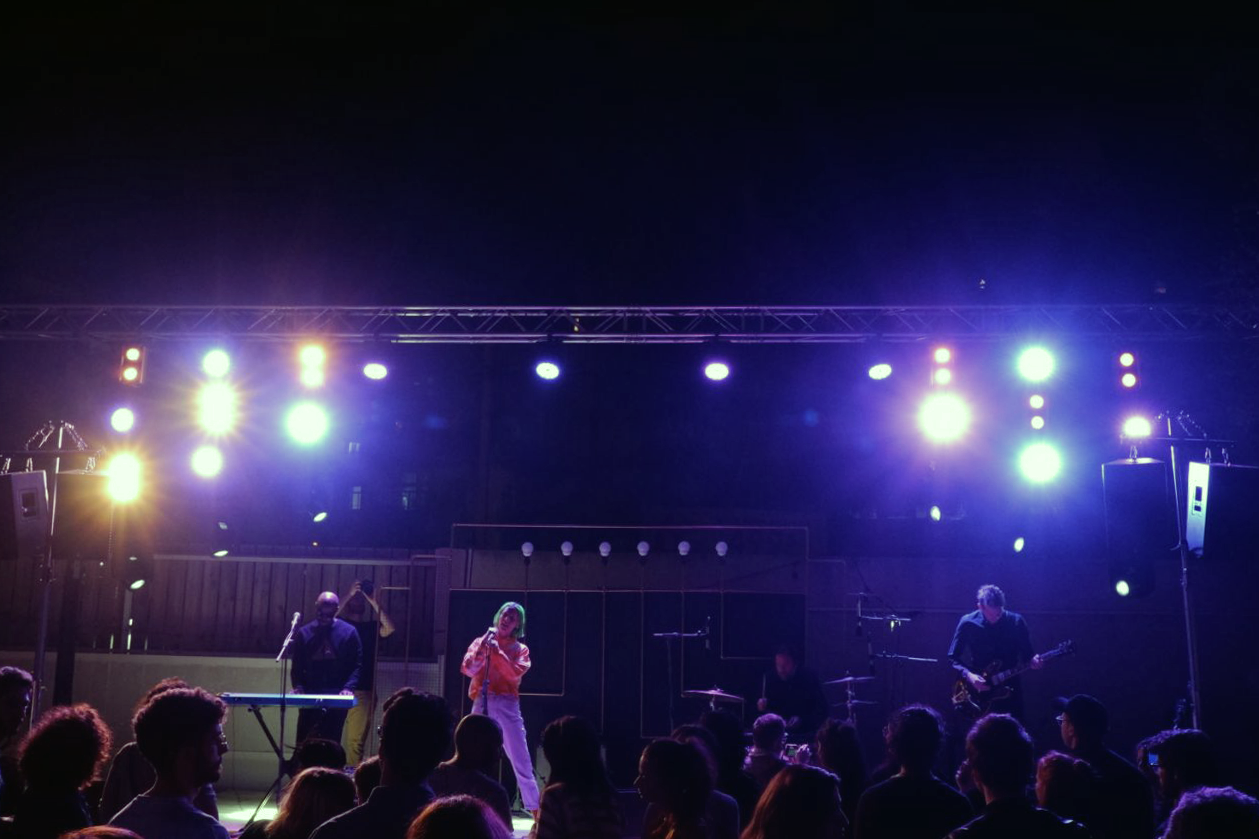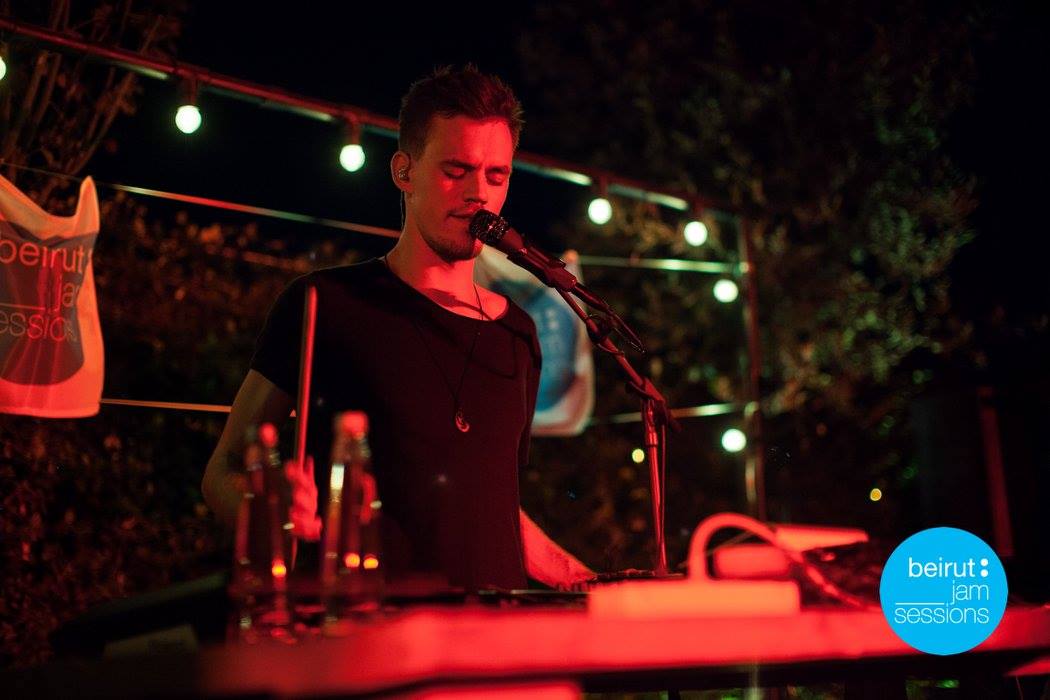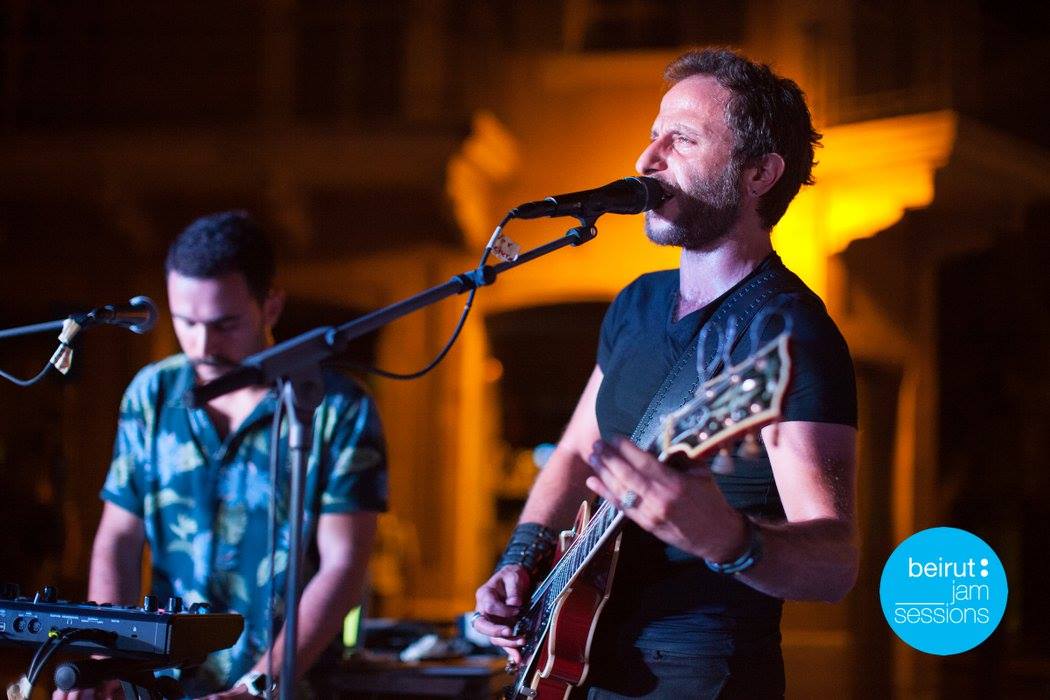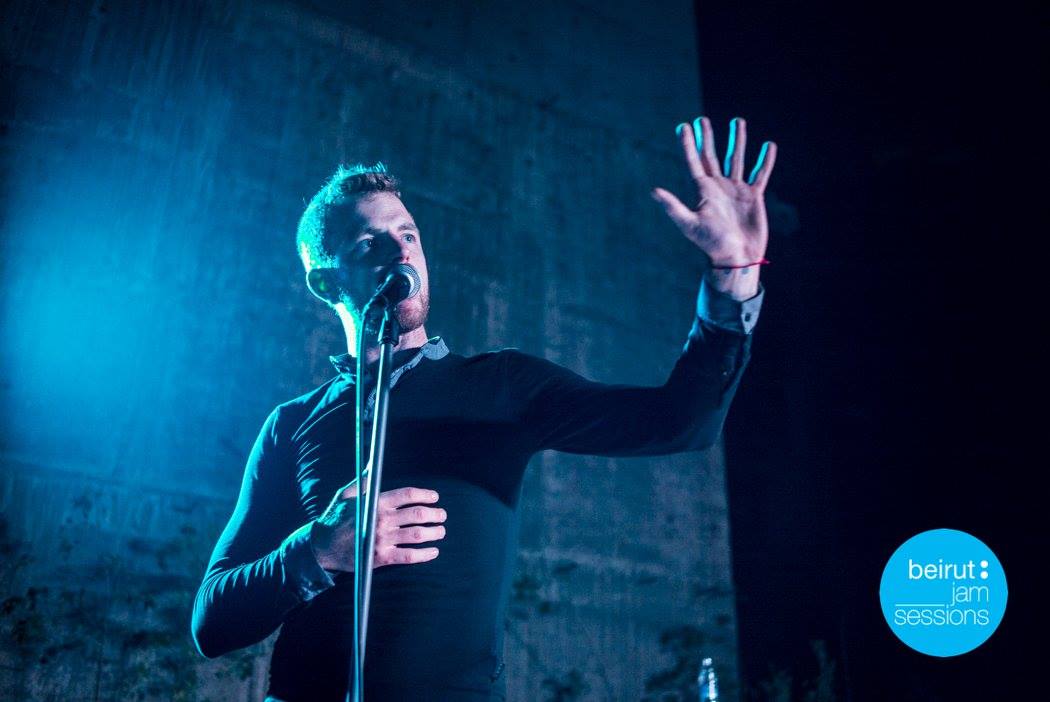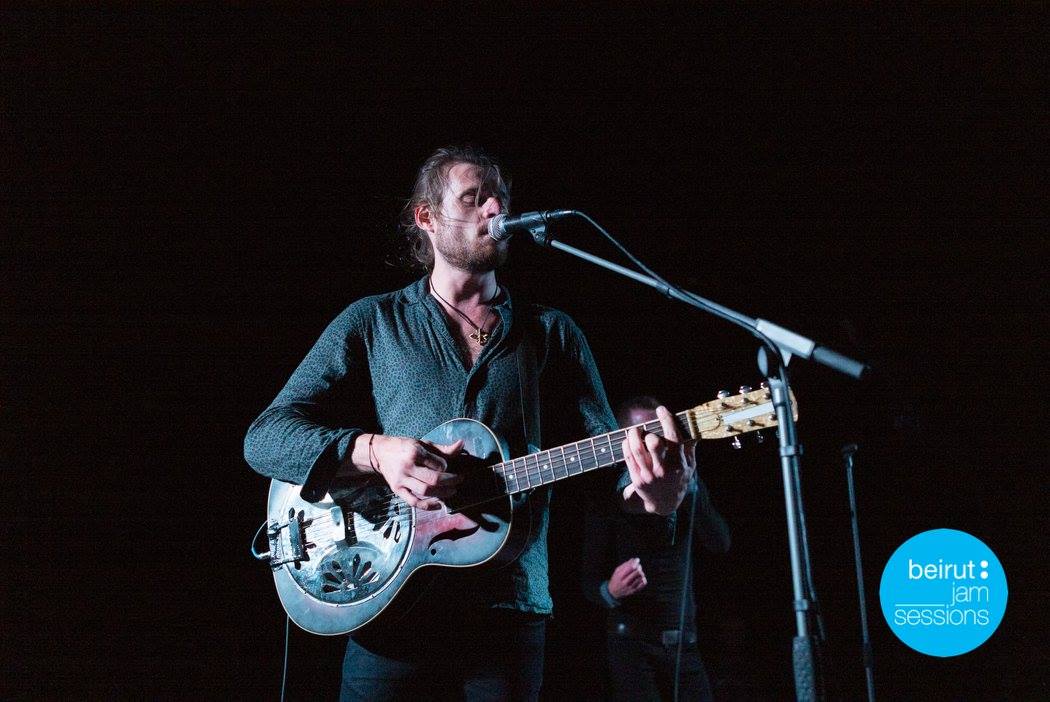What do the co-founders of Beirut Jam Sessions look like seven years down the line? They’re older, wiser, and a lot more easy-going. They still meet in inconspicuous bars and bond over great music, but now it’s with reporters. They also don’t seem tired of Beirut Jam Sessions seven years later, but probably do deserve some rest.
Anthony Semaan and Roy Jamhouri sit with me in the corner of a Badaro pub, a setting that’s not very different from where they first decided, along with 2 other friends, to organize concerts and jam sessions for a set of international, regional, and local acts in June 2012. They’ve been long enough in the industry to speak comfortably and light-heartedly, Anthony sharing his insight on organizing concerts and Roy detailing the ins and outs of filming.
Beirut Jam Sessions has hosted dozens of live shows and jam sessions over the years, more than enough to become a household name in the local and regional music scene. In the heart of it all, time and experience has taught Anthony and Roy to worry less and enjoy life more. The constant anxiety that they once felt about their shows –the one you might find stemming from a twenty-something-year-old who’s hungry for success– no longer haunts them.
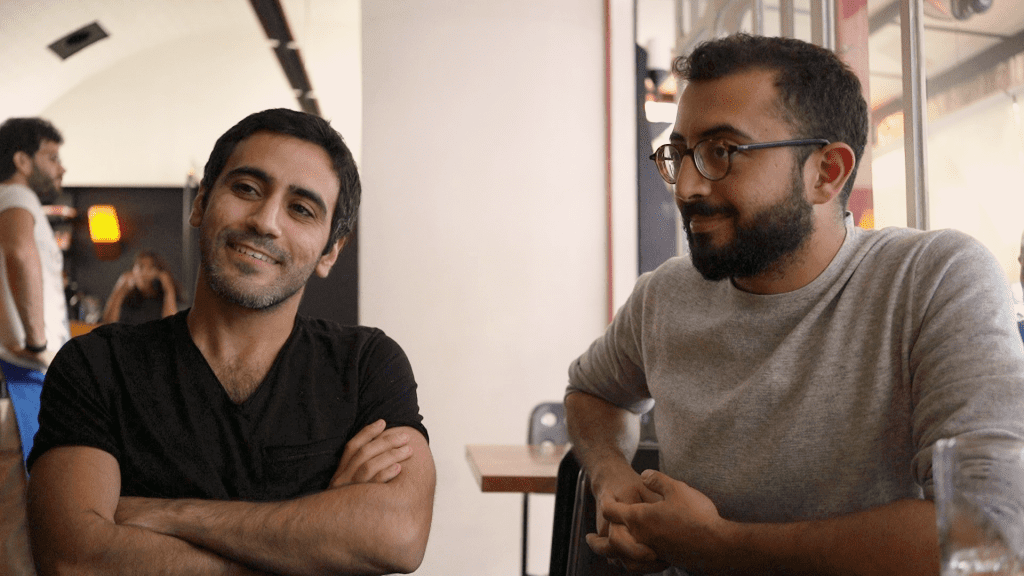
“In the beginning, we used to be really careful and worry about whether our plans would work and look good or not. But now, everything flows kind of naturally,” says Anthony. Through the window to his left, a young woman quietly sits and reads a book on her own outside the pub. Near her, two university students are sipping on their drinks as they argue over the details of what is probably their final year project. “Whatever happens, happens.”
He’s not wrong. Beirut Jam Sessions has survived through the ups and downs of the country, from bomb threats to artists refusing to come over because of the country’s trash crisis. Lots has happened in the past seven years, but their musical project flourished despite the many setbacks that anyone almost certainly would experience in Lebanon.
From Dutch electro-pop singer Thomas Azier to English fingerstyle guitar player Mike Dawes, Beirut Jam Sessions has attracted acts from all over the world. Similarly, their one-take jam videos have also brought in large audiences from across the globe, recently amassing 10,000 subscribers on their YouTube channel. Their most popular video, one of Ibrahim Maalouf, was seen over 300 thousand times. In the video, the French-Lebanese jazz trumpeter is jamming on a balcony by the Byblos Port. In another video, the Wanton Bishops and OAK are rocking out on a bus. A third video has Charlie Winston sitting on an Achrafieh rooftop, and so on and so forth.
“The sessions are just so spontaneous, natural, quick, and a pleasure to do,” says Roy, taking a sip of gin. Making the videos is fast-paced and raw. He only has one take to get it right, but it’s a challenge Roy welcomes. “Everything just happens so fast with interesting people and artists. Musicians who agree to come to Beirut while their embassies are waving red flags are already people who are a little bit on the crazy side. So you often get colorful characters, and working with them is refreshing.”
In our conversation, Anthony and Roy themselves emerge as colorful characters. Their passion for both the music and filming industries, their entrepreneurial eagerness to push through trouble, and their newly-found laissez-faire attitude reflect in their work for Beirut Jam Sessions.
Why and when did you start Beirut Jam Sessions?
Roy Jamhouri: We started in a bar.
Anthony Semaan: Which is convenient considering where we’re sitting now. At the time, it was just an idea. I used to DJ at this bar in Gemmayze called Charlie’s Bar back in the day. It started over drinking and listening to music together, more or less. Initially we were a group of four friends, two of which now work on other projects, that kicked it off.
We started it because, at the time, there was no consistent flow of independent artists coming into Lebanon. We tried to bring artists that we liked, were cool, or thought that people would be interested in. We tried to have them collaborate with local artists, hence the jam sessions, the videos and all that. It was important for us to leave a trace of what we’ve done. We tried and, seven years later, we’re still here. Still trying.
Do you think that your goals have changed over the years?
R: Yes. When we started it was what 2012, and earlier than that there used to be a more prominent music scene. With artists like Blend and Soapkills, it was more active. And then, it died down. It was a bit too calm for our taste, so he wanted to rekindle this music scene and I just wanted to film music. So we started, and the initial goal back then was to organize cool concerts in Beirut, stuff that we’d like to attend. Today, it’s about doing stuff that we enjoy.
A: Plus, we’ve grown and changed. In the beginning we used to be really careful and worry about whether our plans would work and look good or not. But now, everything flows kind of naturally. Whatever happens, happens. If people like it, great. If they don’t like it, it’s fine. We’ve kind of become immune to the inevitable “criticism.”
R: And it’s not our lifeline.
A: Yes, that’s the thing. Today, we work on lots of different things thanks to Beirut Jam Sessions. It’s given us credibility that’s allowed us to get other types of work, with brands, or with people who hire us to do jobs for them. We keep it active so it can keep on growing and rolling organically, doing it’s own thing. It’s not do or die. It used to feel like that, but it’s not anymore.
R: It’s nice to keep a project that’s been going on for almost seven years now. And it plays in our favor in everything that we do.
A: Because the people who want to work with us, see that we have longevity and we deliver. They see that we’re consistent, and that, even when things go bad or we’re a bit absent, we’re still present in some way. Through videos, small concerts, or whatever. It’s just about being there, doing things and keeping ourselves active.
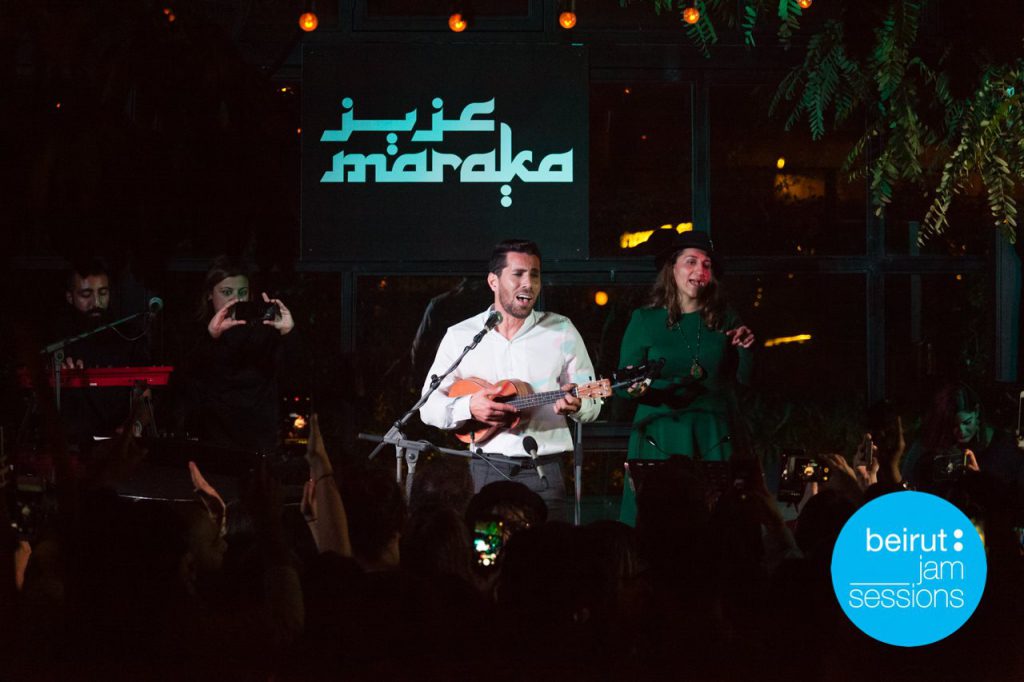
How do you feel going into your seventh year?
R: Taking it year by year.
A: I would even say month by month. I don’t know about Roy, but it just feels natural to me. You just have to keep going, that’s all. We just have to keep doing our thing.
R: It’s become easier because people would actually pay for the shows to be set up, and produced. For the videos, there’s a few people who are excited about doing them, so it never feels like a chore.
A: And for the shows, it’s become easier as well. It’s smoother now, it used to be so hard to do anything. Like really, really difficult.
R: It used to be hard, and risky.
A: And stressful.
R: And a lot of the shows were cancelled over the years because of the situation in Lebanon.
A: In the past we had a lot of cancellations. Most recently last year, we had one with Jalon N’Gonda. There are always things that happen, but we know how to deal with it better now. It used to be stressful and tiring. It really felt like “do or die” but it’s changed now. Now it feels like, if something gets cancelled, it’s fine. We’ll keep going and see what happens.
You said it was getting easier, but what is the most difficult thing for you in organizing and filming?
R: In filming, finding cool locations is always interesting. I would say that the timing is also difficult, especially when we’re filming an artist from abroad between soundchecks and landing–
A: There are some things that people really don’t know. For example our most popular video is Ibrahim Maalouf, it’s been seen like two hundred and fifty or three hundred thousand times. That was filmed in twelve minutes. We had one shot.
R: The bigger the artist, the less time you have with them.
A: And when I say twelve minutes, I mean that you walk in, tell the artist that you’re filming them, they play, and you’re done. And in twelve minutes, whoever is filming is under massive pressure to deliver. It’s all handheld and there’s no turning back.
R: You can’t really second guess yourself, at least while you’re filming.
A: And you’re not gonna stand still.
R: Because that’s boring. You have to move, you have to make them move as much as you can. You don’t have a second shot, so very often what you have is what you get. Especially since the musicians give you their energy in one go, and then they’re done. So you want to make it interesting and you try your best not to ruin shots by shaking.
Musicians also often look at your face to know how they should feel. So you have to be smiling all the time, even though your shot might look horrible but you can’t really show that. But it’s fun, it’s a great exercise and basically, it’s kind of like jamming with them. You’re part of the performance. So it’s a cool improvisation. And we don’t really do jam sessions anymore. It’s been a while now.
One of the hardest things that we have to deal with while filming is sound. Our sound engineers are amazing. They do everything they can to record each voice and each instrument while keeping everything hidden, to let viewers enjoy the performance as if they were standing there. It’s very often one of the hardest things we do, because Beirut is very noisy, as you know, and Anthony likes to challenge us with the tough locations.
A: I can fully say with confidence that, when it comes to the sessions and concerts, we’re surrounded by an incredible team. The team that produces, the team that films, the team that captures the sound, the guys that work on the ground with us, the guys that do the stage, light, and sound. If we look at it overall, people have come and gone throughout the years, but the core has always remained the same. Even those who are no longer part of the project, everyone has always done a great job. We’ve been really lucky and well-surrounded from the very beginning.
R: They’re good, and it’s harder than it looks, so they’re really good.

So how come you stopped doing jam sessions featuring locals with international artists?
A: Because before, we used to have local artists and international artists perform together. That was the jam session. Logistically, it became hard. Artists didn’t always agree, and the Lebanese scene is a bit dry right now. So we’ve decided to take a step back in that aspect, meaning we can film the Lebanese artists on their own but putting them with international artists is more of a difficult challenge today than it was previously.
It feels like you have a lot to say about today’s music scene.
R: I feel like more local artists should sing in Arabic.
A: Internationally, it feels like today there’s more interest when you sing in a foreign language. If you look at the Lebanese artists who have exported themselves in the long run, the best ones are Mashrou’ Leila, Ibrahim Maalouf, Yasmine Hamdan.
And today, the scene has changed. It’s a cycle, same as when we started. There was this little wave that came up, and now it’s gone down, and it’ll come back up in a couple of years. There are a lot of bands out there, but they have to be a little bit different to stand out, it feels harder for them now than previously.
What do you think is the best part of your jobs?
R: For him it’s working with me, of course. That’s an amazing opportunity.
A: (Laughing) I only do it to work with him, there’s nothing else.
R: Getting artists we love, that’s one. Mike Dawes was cool.
A: Personally, the reason I do it is because I enjoy this industry. It’s become something I enjoy, I think I’m good at, and I keep learning from. I’m always learning. Thanks to Beirut Jam Sessions, I keep getting these amazing opportunities. The more I do this, at least on the organizational part and the promotional part, the more opportunities come my way. For me, that’s the main drive. I really enjoy it, and the best part is as soon as the concert ends. The minute when everyone is leaving, I’m relieved because it just feels like “it’s over, it’s done, next.”
R: “One more in the can.” The same goes for filming, I just really love filming music. We usually have to work in many different things in a freelance filming career, between advertising, documentaries, and all of these things. The sessions are just so spontaneous, natural, quick, and a pleasure to do. It’s similar to the concerts.
A: And it’s different with bands. Every weekend here, there are international DJs that come to Beirut, but it’s different when you have four or five different people in a band coming. If one guy says he doesn’t feel like coming, the whole band doesn’t show up. So having a group of people who are excited to perform and film gives you this sense of relief. You’re dealing with genuinely nice human beings and that’s really important.
I’m guessing that that actually starting off Beirut Jam Sessions was a pretty scary thing to do.
A: For me, the scary part was that I had a great job and salary in Spain. My role was set in the sense that if I kept going at it, I would just keep getting better positions. And the hard part was starting again from zero. I had saved up money and I put all of it into Beirut Jam Sessions. Within the first two concerts, I lost all of it. The hard part is losing and losing consistently, and knowing that it was happening. It affects your personal life, it affects your mental health, it affects everything. But then you build this immunity. Today, it’ll take a lot to faze us in work. Today, when anyone suggests a job, I say yes even if I don’t know how to do it. I figure it out and learn it.
R: Personally, I had nothing to lose but I think that the hardest thing in the beginning was just getting used to the fact that, once you release something, it’s out there with all of its mistakes and all of its imperfections. It used to drive me crazy.
A: There are a lot of videos with a lot of funny moments or mistakes. Many of them include him making sounds or hitting people. There’s a session where we were filming an amazing guitarist called Mike Dawes. We filmed him in a teleferique and while he was doing this incredible fingerpicking thing, all you hear at some moment is Roy going “wow.” The guy doesn’t sing, so it’s the only moment where you hear a voice in the video and there was no way to remove it.
R: And Anthony looks for these moments.
A: There are always these little moments that are really funny for us.
I like to think that’s in the spirit of things.
R: Yes, of course. Eventually, that’s what we realized.
A: I always felt it from the beginning. He was always like “No, I can’t believe this is happening, I messed up here and there” but I always felt like that’s what it’s about, you know? It’s the same thing at a concert. There’s so many times when we mess up consistently, and it’s fine, we figure it out.
It’s probably also a bit about people always being too hard on themselves. We notice things in our performance that others don’t.
R: That’s one thing. But also, at the end of the day, it’s music shows and music videos. It should be a bit on the raw side of things. People are there for an experience, anyway.
I’m a bit curious about how you select the musicians who perform.
R: it’s organic. There are many ways.
A: There’s always stuff that I would like to have in a video session and stuff that Roy wouldn’t, or vice versa. But we go for it anyway. That’s for the sessions. For the concerts, we ask absolutely everyone, to see who’d be willing to come to Beirut.
Who would you love to bring to Beirut today? (Ha, ha.)
A: For me, I would bring a band like Arcade Fire or Foals. Those are two bands that we love, but bringing these bands costs a quarter of a million dollars, and doing that is ridiculous because you will never make that money back in a city like Beirut.
It’s like deciding that I’m about to lose my whole life for this to happen, because that’s how hard it is. Even if you get all the sponsors in the world, not that many people are going to show up, you know? I’m lucky to work with Byblos Festival and I’ve seen it with bands like Alt-J, Beirut, Milky Chance, which are more commercial and popular in this scene. And you don’t get the numbers you might think of. That’s the reality of the situation.
We got Elton John to Byblos Festival, and there were eight thousand people watching him. Just before, he was headlining Wembley in London. He charges the same fee, be it at Wembley or Beirut, so it doesn’t make sense for Lebanon. That’s what people have to understand. Lebanon is a tiny, tiny place on Earth that very little people care about. I always say just “zoom out.” Open the world map, get a view of Lebanon and just zoom out. Get a bit of perspective to realize that nothing really matters, but just keep doing it.
R: There are regional bands.
A: There are regional bands who are good, and cool as well. It could be interesting.
R: Partly, what we want to try and do more of is bring more Jordanian bands, Egyptian bands, and people who sing in Arabic, because that’s one way to motivate the local bands over here as well.
A: So we look at that and it’s not to criticize, but the message is there for our locals. There’s a reason why the local Lebanese scene has some difficulties in exporting itself and growing properly abroad. The facts and numbers are there, it’s not us who are inventing anything. With a little bit of analysis, and getting out of our bubbles, we’ll notice who plays in which countries, why there’s little interest from Jordan or Egypt in Lebanese bands. It’s there and it’s clear.
On another note, do you think that the musicians who come to Lebanon have a lot of misconceptions about the country?
A: All of them. Imagine having to go to a country, and the embassy genuinely tells you not to come. The thing is that you have to justify your country all the time. Our country doesn’t make itself easy to justify, but for us it’s easier with our track record. Bands think “Oh, these guys went, so we should go.” And then they check out our YouTube channel and see our fun videos, which help a lot in tracking records. It becomes easier, but there will still be people who ask questions, and it’s normal. There’s even a band that refused to come to Beirut because of the trash crisis in 2016.
What are the most impressive acts that you’ve seen over the years?
A: We Are Match, Mike Dawes, and We Were Evergreen. Though I’m sure I’m forgetting so many.
R: Camp Claude was cool from the recent ones, I enjoyed it. There’s also Aziz Maraka.
A: That was a shock. It was the first time we bring an Arabic-singing artist. He had fanatics. This guy doesn’t have fans, he has fanatics.
R: We had people who travelled from Syria and Jordan that showed up at the door. The show was sold out, but we can’t tell them no. They travelled for it, what can you tell them?
A: I liked Heymoonshaker a lot.
R: The early stuff was great, we have a lot of memories. There’s also Emilie Gassin.
A: It’s always been a nice experience. Every show. It’s always nice memories, even the videos. There are so many impressive acts but We Are Match were the number one for me.
Do you have anything you’d like to add?
A: Maybe some advice for artists and for people who want to start their own projects.
R: Try singing in Arabic and don’t take yourselves too seriously.
A: I would say keep playing live, because none of them play live enough. Explore your country, because there’s a lot of places outside of Beirut that they could play at. And try to integrate your local culture within what you’re doing somehow. If it’s not language, let it be in another way, so that people here can relate to it. I mean, work from within, then start exporting, rather than thinking about emulating foreign bands and then coming this way. You work from here, then you go out.


